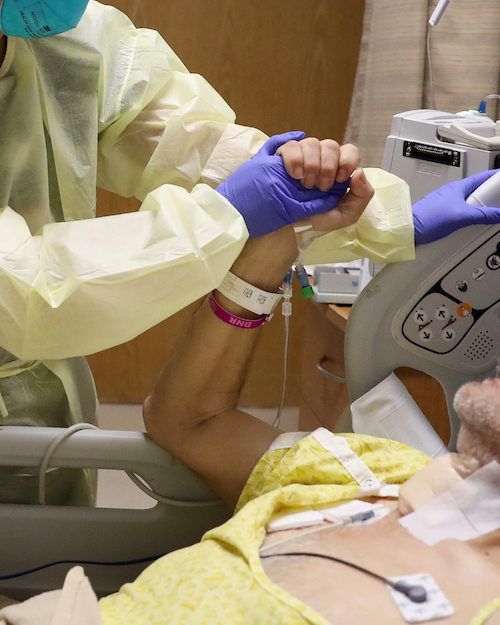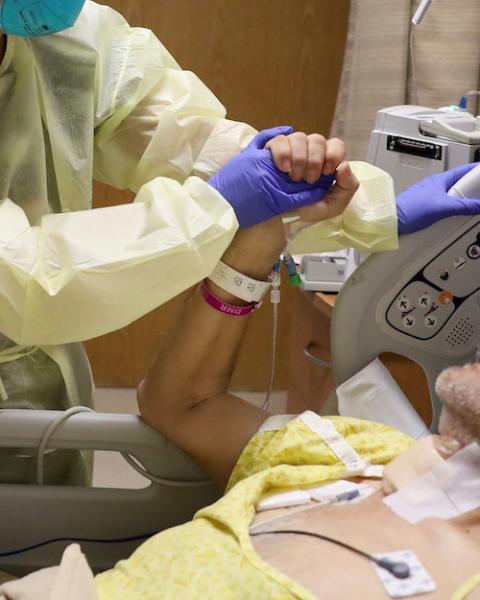
A health care worker in Los Angeles takes care of a coronavirus patient. (CNS/Reuters/Lucy Nicholson)

A health care worker in Los Angeles takes care of a coronavirus patient. (CNS/Reuters/Lucy Nicholson)
In the midst of the COVID 19 chaos, many of us are also swamped by grief of loss of a loved one. Then, we have to try to understand the seemingly impenetrable U.S. healthcare system and its billing practices. As a Catholic Sister, I believe that every person has a right to healthcare, but right now – during this deadly pandemic – costs stand in the way of Americans and the lifesaving care they need. This burden is especially felt by people of color and exacerbated by surprise medical billing—a problem that must be remedied, especially for COVID-19 treatment.
I fought for the promise of the Affordable Care Act as a Nun on the Bus. We won that fight and expanded healthcare coverage to millions of Americans, but there are still holes in our system that too many people are falling through. Surprise medical bills are received after a patient is treated by an out-of-network provider, such as for lab work or emergency care, even if they were treated at an in-network hospital. During emergencies, patients can't choose the facility — let alone verify its network status — where they would like to be treated. Often all we can do is pray as our essential emergency workers do their job to treat us. When insurance providers refuse to cover the costs of care, sometimes even after the fact, patients are left to pay a high unexpected bill. While some providers will send a balance bill to patients, not all providers will do this. The stress of these bills weighs on peoples' spirits, and the bills have long-term impacts on our ability to thrive.
According to the University of Chicago, nearly 6 out of 10 Americans have received surprise medical bills — a problem that will only get worse as they seek treatment and endure economic hardship during this pandemic. Insurance deductibles often range from $1,500 to $6,000, and co-pays for emergency treatment can be $500 or more. We need a system where cost doesn't stop people from seeking treatment, especially as our nation tries to get COVID-19 under control. We need a solution that prioritizes the care and well-being of all.
Advertisement
This issue is made more dire with the increased health risks of people of color who are more likely to be uninsured, live with long-term health problems and reside in areas with fewer hospitals. People of color have been especially hard hit by COVID-19 — with Black populations making up a disproportionate amount of COVID-related deaths — and often face the brunt of hospital closures and limited access to health care. The needs of people of color must be centered in discussions of surprise medical billing.
Lawmakers need to settle the issue of surprise billing by prioritizing the needs of patients over the desires of insurance companies. During the COVID-19 pandemic, we have to strive for a system that ensures all Americans have access to the testing and treatment they need to protect themselves and their communities. Congress needs to create an even playing field for patients, doctors and insurance providers so patients can seek treatment without fear of receiving exorbitant bills.
A solution must also acknowledge the obvious disparities in the treatment of people of color. Congress can't fall into the trap of believing that nothing can be done to fix this massive problem. The solution must focus on ensuring underserved populations — the elderly, people of color, the disabled, and so on — have access to the critical care they need while simultaneously ensuring doctors and hospitals can afford to offer the same level of care they currently do. Insurance companies have plenty of profits and cash reserves to actually fund care for their clients. As every one of us makes sacrifices during the pandemic, the faithful way forward for insurers is to sacrifice some of their profit margins so that more Americans can survive.
Congress must offer financial security and stability for at-risk hospitals — primarily those serving rural, hard-to-reach communities, as well as traditionally underserved urban ones — to preserve access and affordability for all patients. We also need a fair way to resolve fights between insurers and out-of-network providers that often end in patients paying more. An Independent Dispute Resolution system will bring in a neutral arbiter who will be fair to the providers and isn't focused on maximizing insurance company profits at the expense of the patients.
As a country, we have suffered immense losses over the past months, but ensuring that everyone has access to life-saving care that does not carry the fear of surprise bills and potential bankruptcy is morally right and the only way we'll make it through this crisis. Putting an end to surprise medical billing would be a big step forward — a step toward ensuring that the most vulnerable Americans receive the treatment they need. As Pope Francis says, people must come before profit. Insurance companies should start listening to him.
[Social Service Sr. Simone Campbell is the Executive Director of Network Lobby for Catholic Social Justice and leader of Nuns on the Bus. She has led six cross-country Nuns on the Bus tours focused on tax justice, healthcare, immigration reform, voter turnout, and mending the gaps in income and wealth inequality.]





